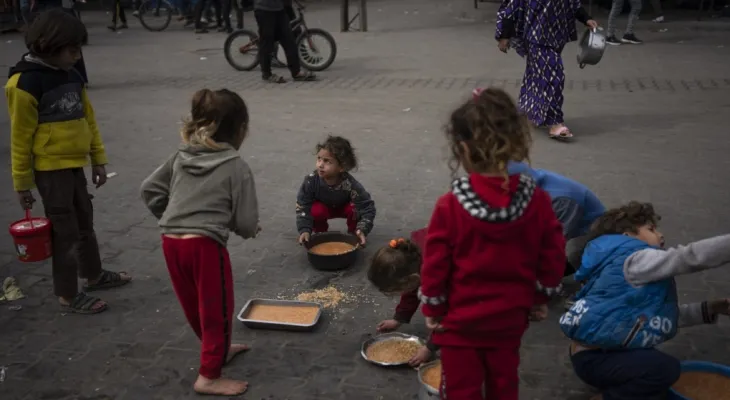Search here
Newspaper
Search here

Arab Canada News
News

Published: March 6, 2024
The United Nations World Food Programme confirmed that airdropping aid will not prevent famine in Gaza and that its efforts to deliver much-needed food supplies to northern Gaza face significant challenges, noting that it sent a food convoy of 14 trucks, but the Israeli forces returned them after a three-hour wait at the Wadi Gaza checkpoint.
According to the United Nations Media Center, the Deputy Executive Director of the World Food Programme, Carl Skau, explained that this convoy was the first sent by the program since it suspended aid deliveries to the north on February 20. The program continues to explore all possible ways to do so. After the trucks were denied entry, their route was changed, then they were stopped by a large crowd of desperate people who took the food and about 200 tons from the trucks. Land routes are considered the only option to transport large quantities of necessary food to avoid famine in northern Gaza.
The World Food Programme said that earlier, 6 tons of food supplies provided by the program were airdropped, sufficient for about 20,000 people in northern Gaza. Skau said that airdropping is the last resort but will not prevent famine, emphasizing the need for entry points to northern Gaza.
The UN official pointed out that hunger has reached catastrophic levels in northern Gaza, where children are dying from hunger-related diseases and suffering from severe levels of malnutrition. He said a massive relief operation requires more entry points to Gaza, including from the north and using the Ashdod port, stressing the urgent need for a ceasefire in Gaza to enable an operation of this scale.
The World Food Programme stated that it and its partners can prevent famine if greater security is provided for humanitarian workers to regularly transport food and other supplies throughout the territory and with routes from the north.
On its side, the United States confirmed the necessity for Israel to take urgent steps to expand the delivery and distribution of humanitarian aid, including by opening more crossings.
This came, according to what the US State Department published in a statement on its website today, Wednesday, during a meeting between US Secretary of State Antony Blinken and Israeli War Cabinet member Benny Gantz in Washington, D.C.
Blinken stressed the need for a credible and implementable humanitarian plan before any large military operation in Rafah, given the risks faced by civilians.
He also confirmed that the United States supports steps aimed at enhancing lasting peace and security for both Israelis and Palestinians.
Blinken emphasized the importance of reaching an agreement to secure the release of Israeli detainees held by Hamas, which would lead to a temporary ceasefire and allow additional humanitarian aid to enter Gaza.
He affirmed that even as talks continue to reach such an agreement, Israel must take urgent steps to expand the delivery and distribution of humanitarian aid, including by opening additional crossings.
The Palestinian Ministry of Health announced today that famine is deepening and will claim thousands of lives if the aggression is not stopped and aid is not immediately delivered, confirming the rise in the number of malnutrition and dehydration victims inside Gaza to 18 martyrs.
Palestinian Health stated that famine in northern Gaza has reached deadly levels, noting that the occupation is committing massacres against hungry bellies in northern Gaza, calling on the international community to pressure to stop the occupation’s aggression.
Comments